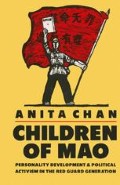Abstract
When Mao Zedong gave young people the green light to assail the established order in 1966, the tensions, antagonisms, anger, self-disdain and bottled-up frustrations of the preceding years exploded into violence. The conscious basis for the young people’s behaviour was to ‘defend Chairman Mao’s revolutionary line’; but this became, as shall be seen, a rationale for the expression of their personal interests and emotional yearnings.
In the period just before the call of January 1967 to ‘seize power’, the weather was quite cold. But when I walked in the streets the wind seemed like a spring draught wafting toward me. I’d never felt so free. Ah, it was truly exhilarating. I felt myself so lucky to have been born at this time of history in China, born under the flag of Chairman Mao — on the one hand to have been liberated by Mao Zedong, and on the other to have experienced such a sublime sense of freedom.
Respondent Chang, Deputy Commander of Canton’s secondary school Rebel Red Guards
At the end of the Cultural Revolution in 1968 we were distraught. We simply couldn’t figure out why, having plunged into Mao Zedong’s Cultural Revolution with completely dedicated hearts, and having followed Mao Zedong’s footsteps, in the end we could have fallen into prison.
Respondent Deng, Commander-in-chief of the secondary school Rebel Red Guards
Access this chapter
Tax calculation will be finalised at checkout
Purchases are for personal use only
Preview
Unable to display preview. Download preview PDF.
Notes and References
It is interesting to note that the same chaotic situation resulting from a profusion of personal grievances occurred in Peking University as well, as recorded by a French student who was studying there at that time: ‘Many of the students at first seemed to lack a theoretical basis for their attacks on Lu P’ing [Party Committee Secretary of the university], and they acted largely in the context of their somewhat mechanical “official lives”. But in the days that followed a change began to occur. Their “official” political lives gradually began to become integrated with their private lives as, lacking theoretical notions, they found they had to talk in very personal terms about their lives under the old administration. Students described their feelings of oppression and intimidation. Some of the girls’ speeches were like “Greek tragedies”: swept up by their emotions, crying and tearing out their hair, they related how miserable they had been.’ In Victor Nee, The Cultural Revolution at Peking University (New York: Monthly Review Press, 1969) p. 60.
Jonathan Unger, Education Under Mao (New York: Columbia University Press, 1982) chs 7 and 10.
Max Weber, Economy and Society: An Outline of Interpretative Sociology, ed. by Guenther Roth and Claus Wittich (Berkeley: University of California Press, 1978) pp. 248–54.
‘Origin Theory’, High School Revolutionary News, 2 Feb 1967, p. 3; translated in Gordon White, Class and Class Origin, pp. 71–93. Within a few months, nearly one million copies of the article were reproduced by students and circulated. The author of it was executed in 1970 for opposing some of the radical leaders who came to power in the Cultural Revolution. For details see Guang Ming Ribao, 21 July 1980, p. 1 and a report by the author’s sister, Yu Luojin, ‘A Fairy Tale in Winter’, Dang Dai, no. 3 (Sept 1980) 58–107.
See Stanley Rosen, ‘Comments on “Radical Students in Kwangtung during the Cultural Revolution”’, China Quarterly, no. 70 (June 1977) 395–6.
Hong Yung Lee, The Politics of the Chinese Cultural Revolution (Berkeley: University of California Press, 1978) pp. 312–22. Also
Hong Yung Lee, China Quarterly, no. 64 (Dec 1975) 645–55. Also see his reply to
Stanley Rosen’s comments in China Quarterly, no. 70 (June 1977) 399–406.
Milovan Djilas was unknown to the young people, but their critique implied a recognition of a ‘new class’ in socialism as defined by Djilas: ‘The new class may be said to be made up of those who have special privileges and economic preference because of the administrative monopoly they hold’. Milovan Djilas, The New Class (New York: Praeger, 1957) p. 39.
This article is generally referred to as the Sheng-wu-lian article. Sheng-wu-lien is short for Hunan Province Proletarian Revolutionary Great Alliance Committee. A translation of the article is found in Klaus Mehnert, Peking and the New Left: at Home and Abroad, China Research Monograph No. 4 (Berkeley: Center of Chinese Studies, 1969).
Statistics showing this are contained in Anita Chan, Stanley Rosen and Jonathan Unger, ‘Students and Class Warfare: the Social Roots of the Red Guard Movement in Canton’, China Quarterly, no. 83 (Sept 1980) 445.
Copyright information
© 1985 Anita Chan
About this chapter
Cite this chapter
Chan, A. (1985). The Cultural Revolution: a Test of Political Activism. In: Children of Mao. Palgrave Macmillan, London. https://doi.org/10.1007/978-1-349-07317-7_4
Download citation
DOI: https://doi.org/10.1007/978-1-349-07317-7_4
Publisher Name: Palgrave Macmillan, London
Print ISBN: 978-1-349-07319-1
Online ISBN: 978-1-349-07317-7
eBook Packages: Palgrave Social & Cultural Studies CollectionSocial Sciences (R0)

